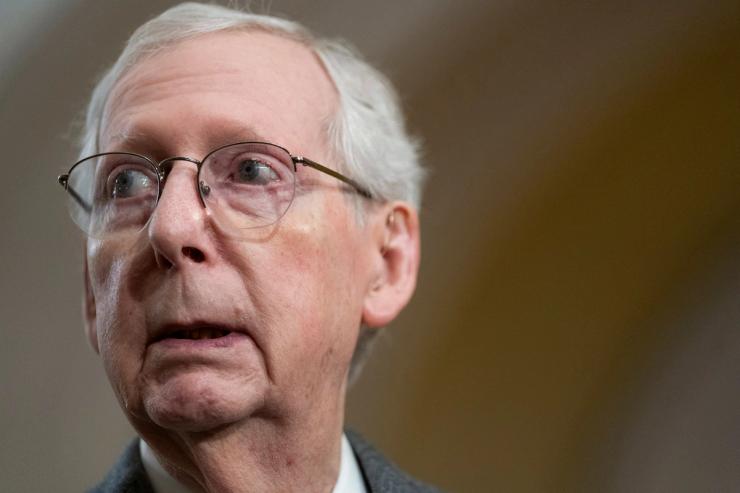The Scene
Sen. James Lankford, R-Okla. sounded dazed and more than a little exhausted on Tuesday, as the bipartisan border bill he had spent months negotiating appeared to implode barely two days after it had been unveiled.
“I’m legitimately surprised at where we are at this moment,” he admitted on CNN. Later, he told reporters that it felt as if he’d been hit by a bus that also backed over him for good measure.
Joseph’s view
The border deal’s collapse amid a right-wing backlash was a blow to Senate GOP leadership, which had thrown its muscle and credibility behind the effort. It also demoralized the handful of deal-minded Republicans who had hoped to grind out conservative wins on one of the party’s core issues, and were left wondering whether their party had lost its ability to legislate.
Tying border enforcement to Ukraine aid was a maneuver originally devised by former Speaker Kevin McCarthy, intended to shore up support among restive GOP lawmakers in the House to approve additional weaponry and other assistance for Ukraine. Speaker Mike Johnson later endorsed it when he assumed the gavel.
That kickstarted negotiations in the Senate, yielding what in many ways looked to be the most conservative immigration compromise in decades — one loaded with new enforcement rules and not much in the way of traditional Democratic priorities.
But opposition from Donald Trump, who has assailed the bill as a “gift” to Joe Biden, helped to make the deal radioactive among Republicans on Capitol Hill, who widely trashed the legislation as a sop to liberals and suggested Biden could fix the border without new legislation. As he effectively pronounced the deal dead on Tuesday, Minority Leader Mitch McConnell couldn’t help but sound rueful.
“I followed the instructions of my conference who were insistent,” Senate Minority Leader Mitch McConnell said at a weekly press conference. “It was my side that wanted to tackle the border issue. We started it. Obviously with a Democratic president and a Democratic Senate, our negotiators had to deal with them.”
Sen. Todd Young, R-Ind., known for working across the aisle on major legislation, told Semafor he believed it was “highly inappropriate” for Republicans to come out in opposition to the border legislation within hours of its release on Sunday evening. He said he thought Republicans reneging on a border agreement they initially demanded would look “chaotic and highly puzzling” to independent voters, a group credited with deciding elections.
“We asked for a border bill, one was negotiated. I’m deeply disappointed we’re walking away,” Sen. Mitt Romney, R-Utah, told Semafor.
Romney argued that politics is tilting towards polarization with each party catering to their respective base. “Politics used to be the art of the possible. Now it’s the art of the impossible,” he said. “We’ve gone from the sublime to the ridiculous.”
The View From The Opposition
Some conservatives attacked the bill on its merits — arguing it would allow too many emergency border crossings before emergency restrictions kick in and gave the president too much leeway on whether to enforce its provisions. But a significant number of Republicans appeared to back away from the effort because they believed it was dead in the House.
Those included Sen. Thom Tillis, R-N.C., who appeared to pull a jarring 180 on the deal after lashing out at colleagues who opposed it late last month. (“It’s all about politics and not having the courage to respectfully disagree with President Trump,” he’d said at the time. “I didn’t come here to have a president as a boss or a candidate as a boss.“)
On Tuesday, though, he said he would vote against the legislation, telling Semafor that he had “fought for letting the discussion go on” but that he didn’t want to force a vote on legislation that appeared doomed in the lower chamber.
“We have to deal with the reality of a House with a thin majority,” he said. “Why on earth would I send them something that only a small minority of Republicans support in a Republican controlled House, it’s just illogical.”
Several GOP senators said the border situation should be left to voters in the presidential election. Sen. John Barrasso, R-Wyo., said in a statement: “I cannot vote for this bill. Americans will turn to the upcoming election to end the border crisis.”
One senior Republican was blunt. “I’m pretty confident we can do better with a new president who actually will enforce the law,” Sen. John Cornyn, R-Tx., told reporters.
The View From Democrats
For Democrats, the incident seemed like something out of the Twilight Zone: The GOP was blocking them from enacting legislation loaded with right-wing provisions. President Biden hammered Trump for opposing the deal and pressured Republicans to stand up to him and vote for its passage.
“It looks like they’ve caving,” Biden said. “Frankly, they owe it to the American people to show some spine and do what they know to be right.”
Sen. Chris Murphy, D-Conn., the chief Democratic negotiator, said the Senate GOP was starting to resemble the rudderless House GOP. “They are a disaster right now. How can you trust any Republican right now?” Murphy told reporters. “They told us what to do. We followed their instructions to the letter and then they pulled the rug out from under us in 24 hours.”
Some Democrats said they believed the border bill’s collapse would let them turn the issue on Republicans during the upcoming election.
“We’re going to be reminding them of ‘You killed it in 2013, You killed it in 2018. You killed it in 2024,’” Sen. Tim Kaine, D-Va., told Semafor, referring to previous bipartisan attempts to pass an immigration or border security bill. “I have 2000 Virginians who died of fentanyl last year. This would have been the biggest fentanyl interdiction investment we would have made. Donald Trump and Republicans killed that.”


